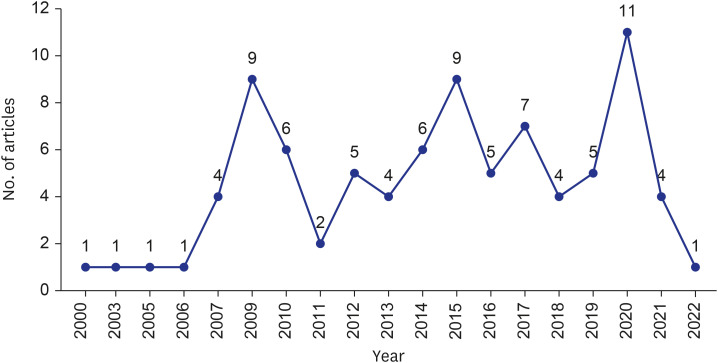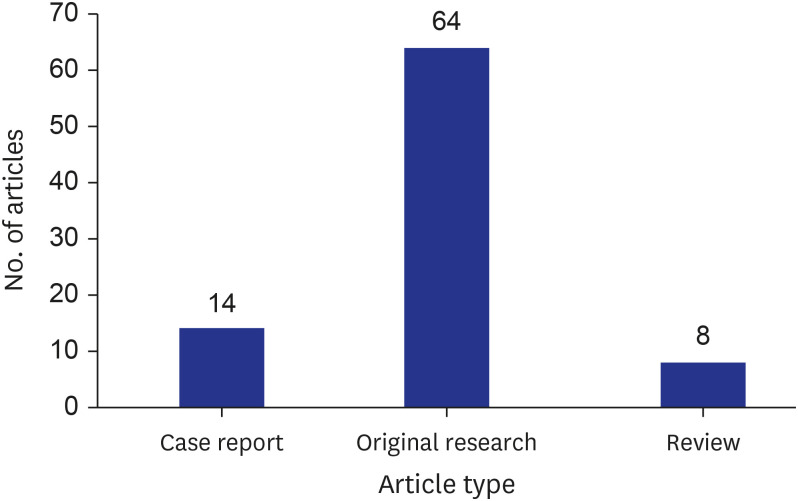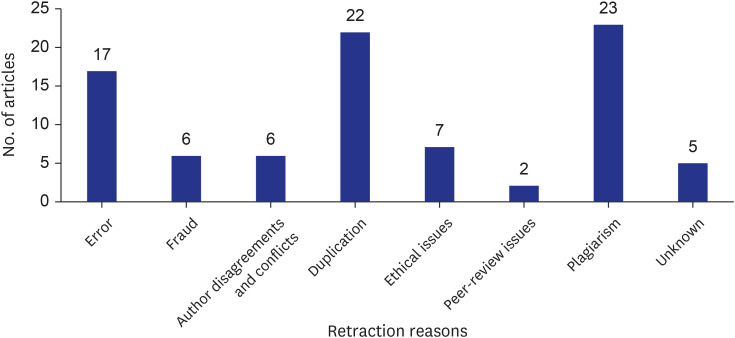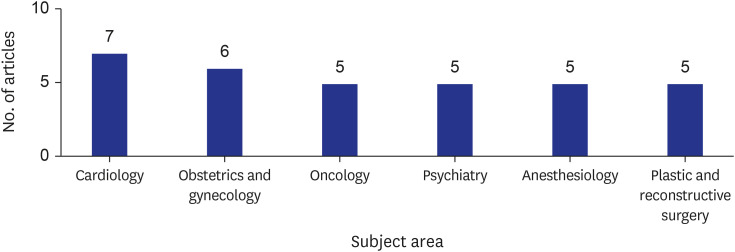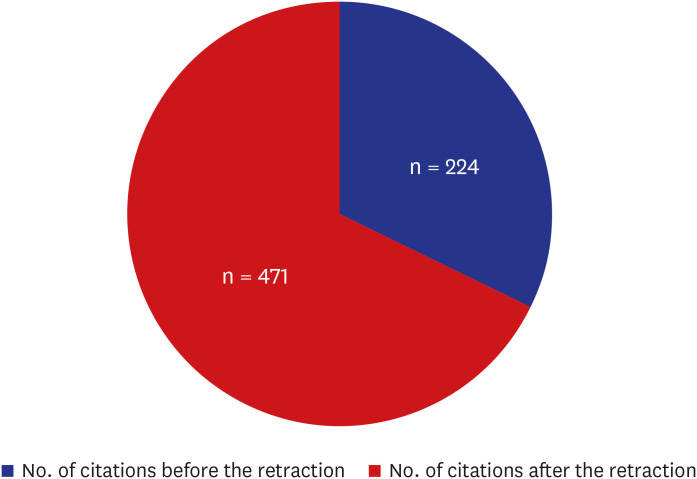J Korean Med Sci.
2022 May;37(18):e142. 10.3346/jkms.2022.37.e142.
Analysis of Retracted Publications in The Biomedical Literature from Turkey
- Affiliations
-
- 1Department of Physical Medicine and Rehabilitation, Faculty of Medicine, Kahramanmaraş Sütçü İmam University, Kahramanmaraş, Turkey
- 2Physiotherapy and Rehabilitation Application and Research Center, Hasan Kalyoncu University, Gaziantep, Turkey
- KMID: 2529709
- DOI: http://doi.org/10.3346/jkms.2022.37.e142
Abstract
- Background
Retraction is a process for correcting the literature and provides a barrier to the dissemination of publications that include major faults or false-misleading data. The aim of this study was to examine the characteristics of retracted articles in the biomedical field sourced from Turkey.
Methods
In this descriptive cross-sectional study, all retracted publications from Turkey on PubMed were listed without date restriction. Data covering the article title, authors, publication date, retraction date, time between publication and retraction dates (in months), journal, article type, country of the corresponding author, peer review timeline (in days), reason for retraction, and subject area of the retracted item were recorded. Citation data were obtained using the Scopus database. The altmetric attention scores of the articles were recorded.
Results
A total of 102 articles were listed and after the implementation of exclusion criteria, 86 articles were included for analysis. The first retracted article was published in 2000 (n = 1), while the most retracted articles were published in 2020 (n = 11). The median time lag between publication and retraction was 10.33 (0.73–144.06) months. The main factors causing retraction were plagiarism (n = 23), duplication (n = 22) and error (n = 17). The total number of citations was 695. A total of 224 citations were in the pre-retraction period and 471 citations were in the post-retraction period.
Conclusion
The retracted article counts showed a rising trend over the years. The leading causes of retraction for articles from Turkey were plagiarism, duplication, and error. It was found that the articles continued to be cited after the retraction. Researchers in Turkey should be educated on retraction, particularly plagiarism and duplication. Strategies should be developed to prevent articles from being cited after retraction.
Keyword
Figure
Cited by 2 articles
-
Characteristics of Retracted Publications From Kazakhstan: An Analysis Using the Retraction Watch Database
Burhan Fatih Kocyigit, Alikhan Zhaksylyk, Ahmet Akyol, Marlen Yessirkepov
J Korean Med Sci. 2023;38(46):e390. doi: 10.3346/jkms.2023.38.e390.Research Integrity: Where We Are and Where We Are Heading
Alikhan Zhaksylyk, Olena Zimba, Marlen Yessirkepov, Burhan Fatih Kocyigit
J Korean Med Sci. 2023;38(47):e405. doi: 10.3346/jkms.2023.38.e405.
Reference
-
1. Palla IA, Singson M, Thiyagarajan S. A comparative analysis of retracted papers in Health Sciences from China and India. Account Res. 2020; 27(7):401–416. PMID: 32279538.2. Gasparyan AY, Gerasimov AN, Voronov AA, Kitas GD. Rewarding peer reviewers: maintaining the integrity of science communication. J Korean Med Sci. 2015; 30(4):360–364. PMID: 25829801.3. Khan H, Gasparyan AY, Gupta L. Lessons learned from publicizing and retracting an erroneous hypothesis on the mumps, measles, rubella (MMR) vaccination with unethical implications. J Korean Med Sci. 2021; 36(19):e126. PMID: 34002546.4. Gasparyan AY, Nurmashev B, Seksenbayev B, Trukhachev VI, Kostyukova EI, Kitas GD. Plagiarism in the context of education and evolving detection strategies. J Korean Med Sci. 2017; 32(8):1220–1227. PMID: 28665055.5. Huh S, Kim SY, Cho HM. Characteristics of retractions from korean medical journals in the KoreaMed database: a bibliometric analysis. PLoS One. 2016; 11(10):e0163588. PMID: 27706245.6. Moylan EC, Kowalczuk MK. Why articles are retracted: a retrospective cross-sectional study of retraction notices at BioMed Central. BMJ Open. 2016; 6(11):e012047.7. Wager E, Williams P. Why and how do journals retract articles? An analysis of Medline retractions 1988-2008. J Med Ethics. 2011; 37(9):567–570. PMID: 21486985.8. Steen RG, Casadevall A, Fang FC. Why has the number of scientific retractions increased? PLoS One. 2013; 8(7):e68397. PMID: 23861902.9. Kocyigit BF, Akyol A. Bibliometric analysis of publication activity in the field of familial Mediterranean fever in 2010-2019: a Scopus-based study. Rheumatol Int. 2021; 41(11):2015–2023. PMID: 34499195.10. Kocyigit BF, Akyol A. Bibliometric and altmetric analyses of publication activity in the field of Behcet’s disease in 2010-2019. J Korean Med Sci. 2021; 36(32):e207. PMID: 34402225.11. Stavale R, Ferreira GI, Galvão JA, Zicker F, Novaes MR, Oliveira CM, et al. Research misconduct in health and life sciences research: a systematic review of retracted literature from Brazilian institutions. PLoS One. 2019; 14(4):e0214272. PMID: 30986211.12. Campos-Varela I, Ruano-Raviña A. Misconduct as the main cause for retraction. A descriptive study of retracted publications and their authors. Gac Sanit. 2019; 33(4):356–360. PMID: 29776690.13. Baydik OD, Gasparyan AY. How to act when research misconduct is not detected by software but revealed by the author of the plagiarized article. J Korean Med Sci. 2016; 31(10):1508–1510. PMID: 27550475.14. Brainard J. Rethinking retractions. Science. 2018; 362(6413):390–393. PMID: 30361352.15. Pourhoseingholi MA, Vahedian-Azimi A. Comments of “A Survey of Iranian Retracted Publications Indexed in PubMed”. Iran J Public Health. 2021; 50(6):1300–1301. PMID: 34540758.16. Grieneisen ML, Zhang M. A comprehensive survey of retracted articles from the scholarly literature. PLoS One. 2012; 7(10):e44118. PMID: 23115617.17. Debnath J. Letter to the editor: Plagiarism in scientific writings: Is there any way out? J Korean Med Sci. 2017; 32(8):1377–1378. PMID: 28665077.18. Chang H. Research and publication ethics in academia. Healthc Inform Res. 2020; 26(1):1–2. PMID: 32082694.19. Park S, Yang SH, Jung E, Kim YM, Baek HS, Koo YM. Similarity analysis of Korean medical literature and its association with efforts to improve research and publication ethics. J Korean Med Sci. 2017; 32(6):887–892. PMID: 28480644.20. Decullier E, Huot L, Maisonneuve H. What time-lag for a retraction search on PubMed? BMC Res Notes. 2014; 7(1):395. PMID: 24965905.21. Dal-Ré R. Analysis of biomedical Spanish articles retracted between 1970 and 2018. Med Clin (Barc). 2020; 154(4):125–130. PMID: 31239080.22. Chen W, Xing QR, Wang H, Wang T. Retracted publications in the biomedical literature with authors from mainland China. Scientometrics. 2018; 114(1):217–227.23. Aspura MK, Noorhidawati A, Abrizah A. An analysis of Malaysian retracted papers: misconduct or mistakes? Scientometrics. 2018; 115(3):1315–1328.24. Fang FC, Steen RG, Casadevall A. Misconduct accounts for the majority of retracted scientific publications. Proc Natl Acad Sci U S A. 2012; 109(42):17028–17033. PMID: 23027971.25. Gupta L, Tariq J, Yessirkepov M, Zimba O, Misra DP, Agarwal V, et al. Plagiarism in non-anglophone countries: a cross-sectional survey of researchers and journal editors. J Korean Med Sci. 2021; 36(39):e247. PMID: 34636502.26. Zimba O, Gasparyan AY. Plagiarism detection and prevention: a primer for researchers. Reumatologia. 2021; 59(3):132–137. PMID: 34538939.27. Hong ST. Plagiarism continues to affect scholarly journals. J Korean Med Sci. 2017; 32(2):183–185. PMID: 28049227.28. Bolland MJ, Grey A, Avenell A. Citation of retracted publications: a challenging problem. Account Res. 2022; 29(1):18–25. PMID: 33557605.29. Budd JM, Sievert M, Schultz TR. Phenomena of retraction: reasons for retraction and citations to the publications. JAMA. 1998; 280(3):296–297. PMID: 9676689.30. Khan H, Gupta P, Zimba O, Gupta L. Bibliometric and altmetric analysis of retracted articles on COVID-19. J Korean Med Sci. 2022; 37(6):e44. PMID: 35166080.31. Gasparyan AY, Ayvazyan L, Akazhanov NA, Kitas GD. Self-correction in biomedical publications and the scientific impact. Croat Med J. 2014; 55(1):61–72. PMID: 24577829.
- Full Text Links
- Actions
-
Cited
- CITED
-
- Close
- Share
- Similar articles
-
- Characteristics of Retracted Publications From Kazakhstan: An Analysis Using the Retraction Watch Database
- Trend of Publications in Microbiology and Infectious Diseases: A Bibliographic Analysis of Korean Literature Retrieved with KoreaMed and PubMed
- The evolution of the regional anesthesia: a holistic investigation of global outputs with bibliometric analysis between 1980-2019
- Bibliometric and Altmetric Analysis of Retracted Articles on COVID-19
- A Comparison of Clinical Outcome and Structural Integrity of Bursal Side Partial Thickness Rotator Cuff Tear after Arthroscopic in situ Repair: Retracted versus Non Retracted

